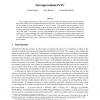Free Online Productivity Tools
i2Speak
i2Symbol
i2OCR
iTex2Img
iWeb2Print
iWeb2Shot
i2Type
iPdf2Split
iPdf2Merge
i2Bopomofo
i2Arabic
i2Style
i2Image
i2PDF
iLatex2Rtf
Sci2ools
117
click to vote
STOC
1999
ACM
1999
ACM
Fast Approximate PCPs
We investigate the question of when a prover can aid a verifier to reliably compute a function faster than if the verifier were to compute the function on its own. Our focus is on the case when it is enough for the verifier to know that the answer is close to correct. The model of proof systems we use is based on variants of existing models of proof systems, such as IP and PCP. We develop protocols for several optimization problems, in which the running time of the verifier is significantly less than the size of the input. For example, we give polylogarithmic time protocols for showing the existence of a large cut, a large matching, and a small bin packing. In contrast, the protocols used to show that IP ¤ PSPACE¥ MIP ¤ NEXP, and NP ¤ PCP¦ § ¨ © ¥ [Sha90, BFL91, ALM+98, BFLS90] require a verifier that runs in ¦ © time. In the process, we develop a set of tools for use in constructing these proof systems.
Related Content
| Added | 03 Aug 2010 |
| Updated | 03 Aug 2010 |
| Type | Conference |
| Year | 1999 |
| Where | STOC |
| Authors | Funda Ergün, Ravi Kumar, Ronitt Rubinfeld |
Comments (0)

